Lost amidst the cacophony of jeers from a portion of the mixed martial arts community ahead of what was supposed to be Bellator's pay-per-view debut, which clumsily turned into a Spike TV broadcast is the story of the return of Eddie Alvarez, the organization's distanced and former champion.
Once Bellator's golden boy, Alvarez's position in the company and career has not been the same since his last encounter with the man some suggest took his spot, Michael Chandler, in November of 2011. Alvarez would go on to earn two more high-profile, impressive victories after that brutal loss, but would soon be mired in a protracted, ugly and often public legal dispute with Bellator CEO Bjorn Rebney and the company over what he argued was a failure to match a lucrative contract offer from the UFC.
The fires of that battle have since been extinguished, but the path to get there was bloody and the road forward for Alvarez isn't clear. A rumored new contract signed could see him exit the promotion with a loss, but UFC President Dana White has stated he has little interest in Alvarez under those circumstances. A win would allegedly require him to immediately defend that title again.
Still, a win in his rematch Saturday could be redemptive in ways few have even considered. Alvarez isn't simply trying to reclaim his spot in the rankings or get revenge on a fighter who beat him. This is his chance to remind everyone of who he used to be and demonstrate he's still that fighter. And depending on one's perspective, this is also an opportunity to get back at everyone Alvarez views as having forgot about him or unfairly attempted to manipulate him in the most important moment of his fighting career.
In this interview with MMA Fighting, Alvarez is adamant he has not a single regret about how he conducted himself in a battle with his still current promoter, how he spent his down time, what the turning point was in negotiations and what he thinks of Michael Chandler, Bellator lightweight champion.
Full audio and partial transcript below.

You sound like you're in a good mood.
Always am, man. No reason to be in a bad mood.
This past year. How would you characterize it?
As a roller coaster, man; roller coaster of emotions. It was a busy year for me. I got a lot done, relocated here to Florida. Had to renovate a bunch of homes in Philly so I could make that happen. Had to sell a home in Philly to make that happen.
On my time off from fighting, I was still really busy doing other things, but I'm here where I'm at now in south Florida training, where I want to be with the best team in the country and seven days away from a world title fight. I'm happy.
Given all those challenges, how consistent was your training?
In life in general, there was probably about about a 6-7 weeks where I just was renovating, working on that whole aspect. But in between renovating I was helping Edson Barboza and Frankie Edgar, they had fights coming up, so I was going over there and giving them some rounds trying to put my best foot forward to give them guys rounds to get them prepared for their fight.
Never completely down and out. There was some time where I just needed to focus on renovating the home, selling some homes. I needed to concentrate my focus on that just so I can keep afloat and get down here to Florida.
Technically speaking, was there you worked on the most to develop in this last year while you were 'off' from a competitive schedule?
There is one thing I changed in my training. I laid off strength and conditioning, which I never really have in the past. Really focused on functional training. I found in the past that strength and conditioning was making me fatigue and tired and was interrupting my functional training: my sparring sessions, my things that I held to the highest importance.
The more I came to Florida, the more I laid off strength and conditioning and focused my mind on getting more MMA rounds in. Five, five-minute rounds, getting a bunch of rounds in, dealing with the adversity of being in the fourth, being in the fifth. Knowing how I can recover from going to an explosive movement, how long it's going to take to recover from that explosive movement.
Just more sparring rounds in general and I feel like it has evolved my game so much and helped my game so much. Being able to them rounds with some of the best guys in the world, that doesn't hurt either. Being where I'm at really helps me.
Does that mean you've had a chance to heal any nagging injuries with the time that's past?
Yeah, that, too. I didn't even think about that, but yeah, that, too. This is one of the first fights I'm going into uninjured. No dings, no injuries. There could be something there. Maybe, maybe not, but I just feel f--king great.
I really did do a lot of strength and conditioning in the past and I kind of cut it out. A guy told me one time that 'You don't see a runner come into a MMA gym to get better at running', so why should we do anything else other than fights to get better at fighting? That's sort of what I'm concentrating on and what I have been.
Circling back to this past year, if you could do it all over again, would you do it differently?
No, no. No, I don't regret any of it. It was necessary. I don't regret any of it.
I believed in everything I was doing. Every action I made, I believed in. I thought I was doing the right thing. I think my best foot forward to do what I had to go to get to number one in the world and if anybody wants to blame me for that, then they can blame me for that, but I'm just trying to do my best to get to the number one spot.
I'm willing to be relentless. I'm willing to do what it takes to get there. I don't regret any of it.
What did that entire process teach you?
It taught me the court system, in general, is no way to settle anything. Normally, if you want to settle something, the best way to do it is sit down as men and talk, continue to keep an open line of communication and continue to talk, regardless of your differences.
But, 100 percent, the court system is no way to settle your differences. Unless you got a lot of time and a lot of money on your hands, going that route is no way to go.
Let's say you knock out Michael Chandler in the first round and now you're the champion again. How's it going to be dealing with Bjorn Rebney? How is it going to be dealing with Bellator management? Do you find that to be an issue?
No! It'd be perfectly fine. Look, I don't have to like Bjorn. Bjorn don't have to like me. I work for myself. Every fighter who fights in the world works for themselves. Regardless, I'm going to be a professional and do what I have to do, but I'm an independent contractor. I'm my own brand and I work for myself just like any other fighter.
Bjorn is a promoter and he works for himself. He don't have to like me, I don't have to like him, but what needs to happen is fights need to be made that fans want. As long as we can both agree upon that - if me and Bjorn don't agree upon anything and we just agree upon giving the fans the fights that they want - then that's all we need to agree upon. That's all we need to come an agreement with, is that.
What was the moment where you said, 'Ok, we have to settle this. We have to move forward'?
I think when I finally made my way down here to Florida because I sold an investment property. I got out of my house and the only reason I came here to south Florida, my only goal in mind was to be a world champion again, you know? To get a world championship belt, to get back to the top, that was my only goal coming here.
I told my wife that. I told my kids that. They made the move with me, supported me along the way and as soon as I got down here I began training. I talked to my management. I said, 'Let's fight. Let's get a fight. To hell with it. Let's get this over with and let's start fighting.'
You can't become a world champion not fighting, so regardless, we had to fight.
Let's talk about Michael Chandler a bit, technically speaking. From the guy you fought to what you have seen today, how would you describe his evolution?
We haven't got to see much of him, so the truth is he don't a have a lot of ring experience. He's getting guys out of there pretty quickly. It's hard to say how good Mike has gotten in the last year and half or two years that we fought.
From my eyes, I'm sure in the gym, he's`been training, getting better, working on some things. But I've been in this sport for 11 years. I know it's very slow moving. You don't evolve overnight. It takes years just to maybe get confident enough in a move or technique to use it in a live fight situation.
It's not going to be too much different except myself, you're going to see a huge difference in myself, in my spirit, in my conditioning, and everything else. Mike, the truth is we haven't got a whole lot of minutes of him in the cage. Can't really tell how much he's evolved or hasn't, but I'm counting on that he's evolved and he's a better guy on Nov. 2nd.
For sure in your mind, what do you know you do better than Chandler?
I just feel like I have a better knowledge, a better overall knowledge of the sport. I just feel like I have a better overall knowledge of the sport, period.
I feel like I'm a better striker. I feel like I'm better at jiu-jitsu. People may laugh at that because I did get choked, but I got caught in the fourth round, which jiu-jitsu doesn't play too much of a factor. I feel like I have better jiu-jitsu, better striking. Just a better all around game. It's really just up to me to go out there and show it, but in my own opinion, I feel like I'm better than Mike altogether. Nov. 2nd, it's time to show it.
When you hear Bjorn Rebney say 'Michael Chandler is the best lightweight in MMA', you respond with...?
No, Bjorn Rebney will say that about anybody. He said that about me five minutes before I lost that fight. It just sort of needs to be said.
I believe - I really believe - Mike's arguably the top lightweight out there. And when I beat him, I'll be the top lightweight. I really believe Mike's at the top of his game. He's top notch. He's one of the best lightweights out there right now. When I win my title back, I will be.
The biggest takeaway from your first fight with Mike was what? What happened that you didn't count on or what was the biggest lesson?
To be more focused, to not let things outside of fighting control my training, control my thoughts, control what's important. Too many external things going on.
I always call the gym my sanctuary. It's the one place where I can focus and just concentrate on fighting and I let things outside come to my sanctuary and disrupt what was going on. That's a big part of the reason I came to Florida, is to just be able to focus on fighting.
If you win on November 2nd, you win the belt back. But if I asked you what you gain, what you get back besides that, what would you say?
I think it's the same feeling after I rematched [Shinya] Aoki. It's personal. It's not personal with Mike Chandler. It's not personal with Bjorn Rebney or the promotion. It's personal with myself. It's important in general just as a human being to fail. And it's important to learn from it, bounce back and do better. It's just a lesson that I want put in action, show myself it's ok to fail as long as you learn from it and come back stronger and do better. This is a lesson I tell my kids all the time, I tell myself, I tell my training partners and it's important for me just to put it in action. Talk the talk and walk the walk.
Is it fair to say as a bonus to winning, do you want to stick it to a few people?
Yeah, why not? I always smile in the back of my head. All of the smirk going on inside and it'll feel good.
During this past year with all the changes and challenges, there have to be some people in your life that have gotten no press but have been instrumental in their help. Who are they?
First and foremost, it's my wife, my biggest supporter of all. My wife and kids. My kids don't have much of a choice. If me and my wife decide, they pretty much have to go. It's been my wife more than anything who has been behind me through this and she's just one of them down ass chicks who, she's for the dream. She's for the goal. She's on board no matter what. She picked her own three kids up, left her home and everything, left everything that's comfortable to her to pursue this dream of ours, not just mine. It's my wife first and foremost.
It's also Glenn Robinson at Authentic Sports Management. He's had my back from the very beginning. He has my best interest in mind. He's not so worried about anything else. A lot of managers are worried about making money, doing this, doing that. He's truly a guy who has your best interest in mind. I wouldn't have been able to get through this without Glenn, Frank and one of my very good friends, Josh. These three guys worked really hard to get us through this past year and I owe a lot to them. I owe a lot to my family.
Someone said to me it's almost as if Michael Chandler not only beat Eddie Alvarez, but took his place in the organization. In some ways, took that part of your life. Do you believe by beating Michael you get that back?
No, no. My spot never leaves me. I am my spot. Regardless of win, loss, whatever. It might change for you guys. It might change for the media, for the common fan, the way you think and feel about me. It never changes for me. I live in a bubble. I think the world of myself. I think I'm number one in the world and no one's ever going to change that for me. I understand my spot. I know what I'm capable of and I'll always be a champion, with or without a belt. That sort of thought don't change. That's silly to even think that.
 A car as big as the Infiniti QX80 definitely needs help seeing what's in back.
A car as big as the Infiniti QX80 definitely needs help seeing what's in back.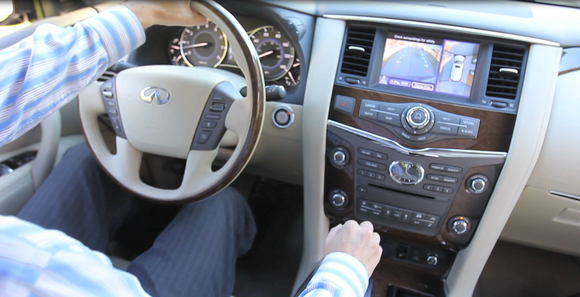 Image: Wayne StenderThe Infiniti QX80's rear camera and rear sensors help you see more around the car, but the driver still needs to remain vigilant.
Image: Wayne StenderThe Infiniti QX80's rear camera and rear sensors help you see more around the car, but the driver still needs to remain vigilant.

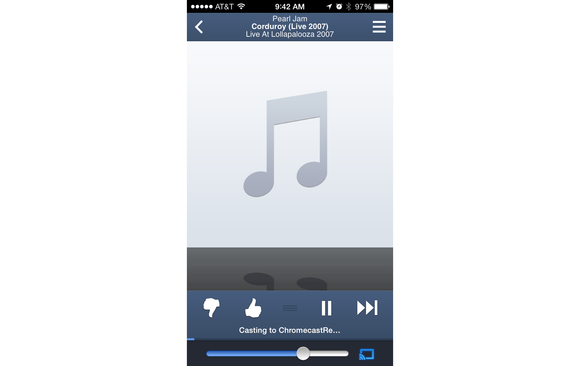



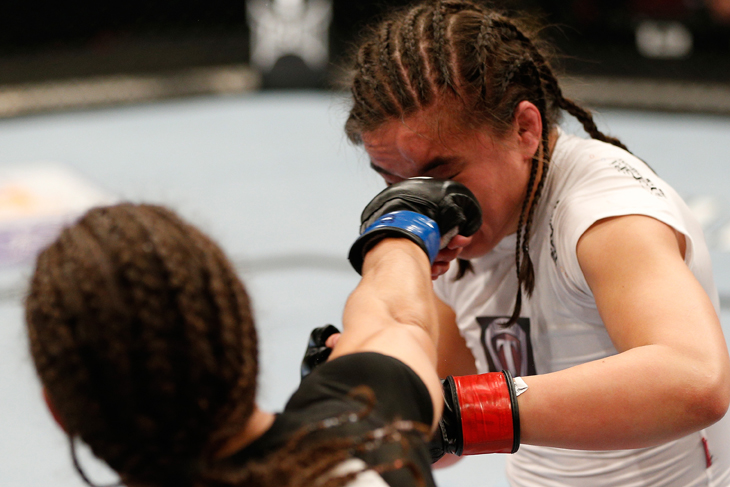 In that euphoric moment when a fighter who, seconds before, had been virtually out cold, rallies to win a significant bout, no one is thinking of concussions or traumatic brain injuries or
In that euphoric moment when a fighter who, seconds before, had been virtually out cold, rallies to win a significant bout, no one is thinking of concussions or traumatic brain injuries or 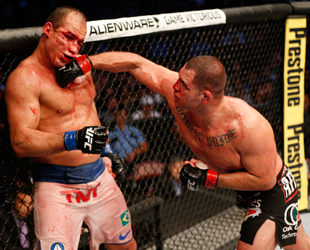
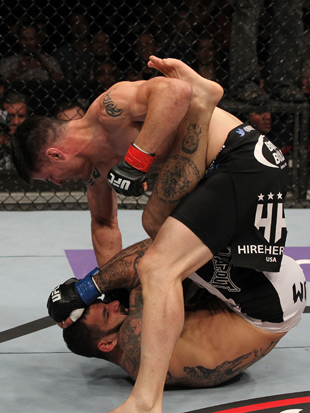 Brian Stann did the same thing in a fight last year with Alessio Sakara. Their restraint, and that of numerous other fighters who have reacted similarly when they realize the opponent is helpless, has been another factor why there haven't been any deaths or traumatic brain injuries.
Brian Stann did the same thing in a fight last year with Alessio Sakara. Their restraint, and that of numerous other fighters who have reacted similarly when they realize the opponent is helpless, has been another factor why there haven't been any deaths or traumatic brain injuries.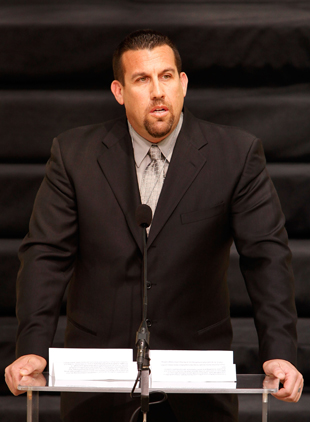 The problem with Martin's thinking is that while someone may have made an error by not stopping a previous fight, the same error shouldn't be repeated, because there can be dire consequences to allowing a fighter to take too many blows to the head.
The problem with Martin's thinking is that while someone may have made an error by not stopping a previous fight, the same error shouldn't be repeated, because there can be dire consequences to allowing a fighter to take too many blows to the head.